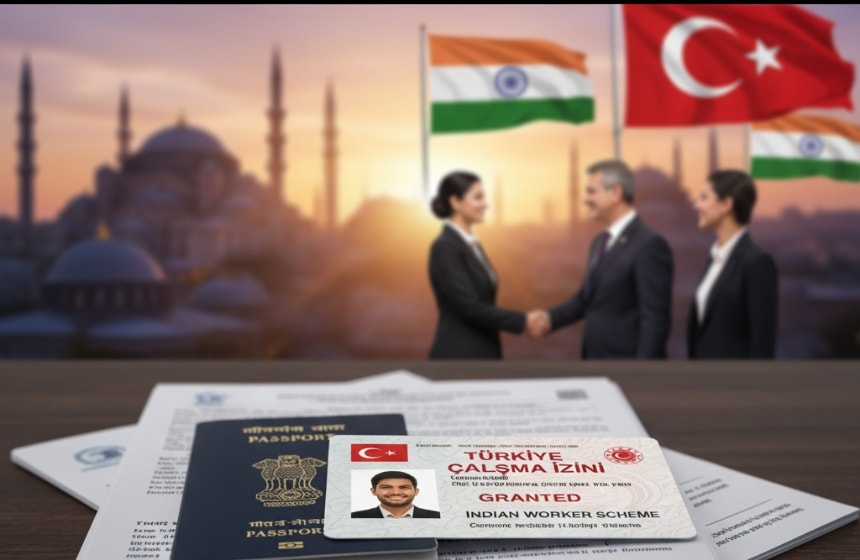Work Permit Regulations for Refugees and Foreign Workers: What It Means for Indians
Turkey has recently introduced significant reforms in its work permit regulations, aiming to create a more inclusive and accessible environment for refugees and foreign workers. These changes are especially beneficial for Indian professionals looking to explore career opportunities in Turkey, a country that bridges Europe and Asia.
In this blog, we will discuss the key aspects of the new work permit regulations, how they impact refugees and foreign workers, and the benefits for Indian citizens.
Understanding Turkey’s Work Permit Regulations
Turkey’s new work permit regulations are designed to streamline the process for obtaining legal employment status in the country. The primary aim is to integrate refugees into the workforce while also opening doors for skilled foreign workers from various countries. Here’s a breakdown of the fundamental changes:
- Facilitated Work Permit for Refugees: The new regulations introduce a simplified application process for refugees, allowing them to apply for work permits in more sectors than before. Previously, refugees faced several restrictions and bureaucratic hurdles, which limited their employment options. Now, they have more flexibility to work in different industries, including healthcare, agriculture, and construction, which are in high demand.
- Special Work Permit Categories for Skilled Workers: Turkey has also categorized its work permits to attract skilled workers in specific sectors. These include healthcare professionals, IT experts, engineers, and teachers. Indian professionals with expertise in these fields can now apply for a work permit more easily, as the eligibility criteria and documentation requirements have been adjusted to attract international talent.
- Long-term Work Permit Opportunities: The recent changes also extend long-term work permit options to foreign workers who have legally resided and worked in Turkey for at least eight years. This initiative helps provide job security and a stable career pathway for expatriates, including Indian professionals seeking long-term opportunities.
- Work Permit Exemptions for Startups and Entrepreneurs: Entrepreneurs and startups are given special consideration under the new rules. Foreign entrepreneurs, including Indians, can benefit from certain exemptions and flexible regulations that allow them to establish businesses in Turkey more seamlessly. The government has identified this as a key area to boost economic growth and innovation.
- Sectoral Work Permit Limits Lifted: Previously, certain industries had strict quotas for hiring foreign workers. With the new regulations, these quotas have been relaxed, allowing companies to hire more foreign professionals. This change particularly benefits Indians working in tourism, IT, engineering, and healthcare sectors.
Benefits for Indian Professionals
For Indian professionals, Turkey’s new work permit regulations present many opportunities. Here’s how Indians can benefit from the recent changes:
- Access to Diverse Job Sectors: With relaxed sectoral restrictions, Indian workers can explore job opportunities in various fields. Turkey is experiencing a high demand for professionals in healthcare, IT, engineering, and tourism – sectors where Indians often possess strong expertise. The relaxed work permit policies mean Indian workers can secure positions without facing the stringent limits that previously existed.
- Opportunities for Skilled Indian Entrepreneurs: The work permit exemptions for startups and entrepreneurs are a significant advantage for Indian businesspeople. Turkey’s strategic location as a crossroads between Europe, Asia, and the Middle East makes it an ideal place for Indian entrepreneurs to establish businesses. The simplified regulations lower the entry barriers and promote cross-border trade and business expansion.
- Pathway to Long-term Residence and Citizenship: Indian professionals working in Turkey now have the opportunity to obtain long-term work permits after eight years of legal residence. This offers a stable career path and the possibility of applying for Turkish citizenship in the future. This is an attractive option for those seeking to settle in Turkey or expand their career horizons in Europe.
- Increased Chances of Employment in the Growing IT Sector: Turkey’s IT sector is growing rapidly, with increasing demand for skilled software developers, network engineers, and cybersecurity experts. Indian IT professionals, who are highly regarded for their technical skills, can take advantage of this demand. The new work permit regulations make it easier for companies to hire foreign IT experts without facing bureaucratic delays.
- Improved Employment Conditions for Healthcare Professionals: Turkey’s healthcare sector has significantly expanded, and the demand for qualified doctors, nurses, and medical staff is rising. Indian healthcare professionals, known for their proficiency and expertise, will find enhanced employment opportunities in Turkish hospitals and medical institutions.
Why Turkey Is an Attractive Destination for Indian Professionals
Several factors make Turkey an appealing destination for Indian professionals looking to work abroad:
- Strategic Geographical Location: Turkey’s location offers a unique advantage for professionals aiming to work in an environment that connects Europe, Asia, and the Middle East. It provides a gateway to exploring further career prospects across multiple regions.
- Affordable Cost of Living: Turkey has a relatively low cost of living compared to other European countries. This makes it easier for Indian professionals to save money while enjoying a good quality of life.
- Cultural Familiarity and Hospitality: Turkey shares cultural similarities with India, such as values centred around family and hospitality. This cultural familiarity helps Indian expatriates more comfortably adjust to life in Turkey.
- Expanding Job Market and Growing Economy: With a rapidly growing economy, Turkey seeks skilled professionals in various industries. Indian workers can benefit from this expanding job market, especially in IT, healthcare, engineering, and tourism sectors.
Apply for a Work Permit in Turkey with the Help of Unimoni
Unimoni can provide valuable assistance when applying for a work permit in Turkey, making the process easier and smoother for Indian professionals. Here’s how Unimoni can help you at every step, from securing the necessary documents to handling international money transfers for related expenses.
Document Assistance and Preparation
Before applying for a work permit in Turkey, you’ll need several documents, including a valid passport, employment contract, educational certificates, and other essential paperwork. Unimoni can help by:
- Advising on the Required Documents: Unimoni guides the specific documents needed for your work permit application, ensuring that all paperwork meets Turkish immigration requirements.
- Certificate Attestation Services: Many documents, such as educational certificates and employment letters, may need to be attested for the application. Unimoni offers certificate attestation services, making the process quicker and more convenient.
Guidance on the Work Permit Application Process
Applying for a work permit in Turkey involves several steps, from securing a job offer to submitting the application through a Turkish employer. Unimoni guides you through the entire application process, providing useful insights and instructions to help you navigate the requirements.
Visa Application Assistance
After receiving approval for your work permit, you will need to apply for a work visa to enter Turkey. Unimoni’s visa services can be beneficial hereby:
- Providing Guidance on Visa Applications: Unimoni’s experts can assist you in filling out the visa application form, preparing supporting documents, and ensuring compliance with Turkish visa requirements.
- Tracking the Application Status: They can help you monitor your visa application status, ensuring that any follow-up steps are handled promptly.
Facilitating International Money Transfers for Visa and Permit Fees
The work permit and visa application process often involve fees that must be paid in foreign currency. Unimoni’s outward remittance services allow you to:
- Send Money Internationally with Ease: Unimoni can facilitate secure international money transfers to cover visa fees, application costs, and other expenses.
- Competitive Exchange Rates: Benefit from competitive foreign exchange rates for all transactions, reducing overall costs associated with the application process.
Travel Assistance for Relocation
Once you’ve obtained your work permit and visa, relocating to Turkey will require careful planning. Unimoni can support you by:
- Booking Flight Tickets: Unimoni offers flight ticket booking services, helping you find the best routes and prices for your travel to Turkey.
- Travel Insurance Services: Travel insurance is a must when relocating abroad. Unimoni provides comprehensive travel insurance plans to cover medical emergencies, baggage loss, and other unforeseen situations.
Post-Arrival Support in Turkey
Upon arrival in Turkey, additional steps are required to complete the work permit process. Unimoni’s services extend to:
- Facilitating Money Transfers Back to India: Unimoni’s international money transfer services enable safe and efficient remittances from Turkey to India for those who wish to send money back home.
Turkey’s updated work permit regulations open new opportunities for Indian professionals, making it easier to work there and explore career growth in IT, healthcare, and engineering sectors. With Unimoni’s comprehensive range of services, you can simplify the application process, manage international money transfers, and ensure a seamless relocation experience.
Whether you’re an entrepreneur, a skilled professional, or someone seeking long-term opportunities, Unimoni supports your journey to working in Turkey. Embark on your new career adventure with confidence, and let Unimoni take care of the complexities so you can focus on making the most of the exciting opportunities in Turkey.







